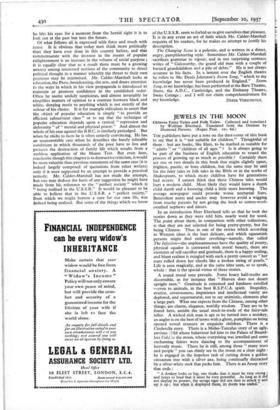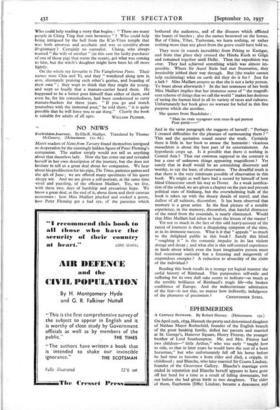JEWELS IN THE MOON
Chinese Fairy Tales and Folk Tales. Collected and translated by Wolfram Eberhard. Translated from the German by Desmond Parsons. (Kegan Paul. los. 6d.)
THE publishers have put a note on the dust-cover of this book to say that it is "not suitable for children." Thoughtful of them : but are books, like films, to be marked as suitable for "adults" or "children of all ages " ? Is it always going to
be part of the business of English education to retard the process of growing up as much as possible ? Certainly there are one or two details in this book that might slightly upset, frighten, puzzle, or bore children, but the same may be said for the fairy tales or folk tales in the Bible or in the works of Shakespeare, to which many children have for generations had access. I cannot think that these Chinese tales would hurt a modern child. Most likely they would leave a dumb child dumb and a knowing child a little more knowing. The average newspaper could provoke worse nocturnal fears.
Benevolent aunts and uncles may however avoid a wigging from touchy parents by not giving the book to cotton-wool- swathed nephews and nieces.
In an introduction Herr Eberhard tells us that he took the stories down as they were told him, nearly word for word. The point about them, in comparison with other collections, is that they are not selected for being pretty-pretty, but for
being Chinese. Thus in one of the stories which according to Western ideas is the least delicate, and which squeamish persons might find rather revolting—namely, that called The Infection—the unpleasantnesses have the quality of poetry,
physical squalor is contrasted with moral beauty, there are elements of self-sacrifice and gratitude, there is a happy ending, and blunt realism is mingled with such a pretty conceit as "her tears rolled down her cheeks like a broken string of pearls." Life is seen magically, and at the same time seen, so to speak, whole : that is the special virtue of these stories.
A sound moral tone prevails. Some hoary half-truths are discernible, as for instance that "Heaven does not desert upright men." Gratitude is esteemed and kindness extolled —even to animals, in the best R.S.P.C.A. spirit. Stupidity, avarice, covetousness, impatience and intellectual vanity are deplored, and supernatural, not to say animistic, elements play a large part. What one expects from the Chinese, among other things, are charm, elegance, worldly wisdom. They are to be found here, amidst the usual stock-in-trade of the fairy-tale teller. A wicked rich man is apt to be turned into a monkey, an angler is on the best of terms with a ghost, pumpkins on being opened reveal treasure or exquisite children. There is a Cinderella story. There is a Midas-Tantalus story of an ugly, envious ziild whose behaviour led him to the Palace of Bound- less Cold in the moon, where everything was jewelled and some enchanting fairies were dancing to the accompaniment of heavenly music. There he is still, among those "many trees and people" you can dimly see in the moon on a clear night : he is engaged in the hopeless task of cutting down a golden cinnamon tree with a silver axe, being continually distracted by a silver-white cock that pecks him. There is an Aesop story that ends :
"A donkey looks so big, one thinks that it must be very strong ; and brays so loud that it must be very powerful. As long as it did not display its powers, the savage tiger slid not dare to attack it and eat it up ; but when it displayed them, its doom was sealed." Who could help reading a story that begins : "There are many people in Ching Ting that own brownies " ? Who could help being intrigued by the bell from the K'ai-Yiian temple that was both amorous and act obatic and was so sensitive about iIkgitimacy? Certainly no surrealist. Chang, who always wanted " the wife of another" (in this case the lucky purchaser of one of those pigs that warm the ocean), got what was coming to him, but the witch's daughter might have been let off more lightly.
On the whole my favourite is The Vainglorious Poets. Their names were Chia and Yi, and they "wandered along arm in arm, alternately praising each other's genius, and boasting of their own " ; they wept to think that they might die young, and wept so loudly that a manure-carrier heard them. He happened to be a better poet himself than either of them, and even he, for his conceitedness, had been condemned to carry manure-buckets for three years. " If you go and match yourselves with the immortal poet," he told them, "it is quite possible that he will force you to eat dung." Clearly the book
is suitable for adults of all ages. WILLIAM PLOMER.











































 Previous page
Previous page